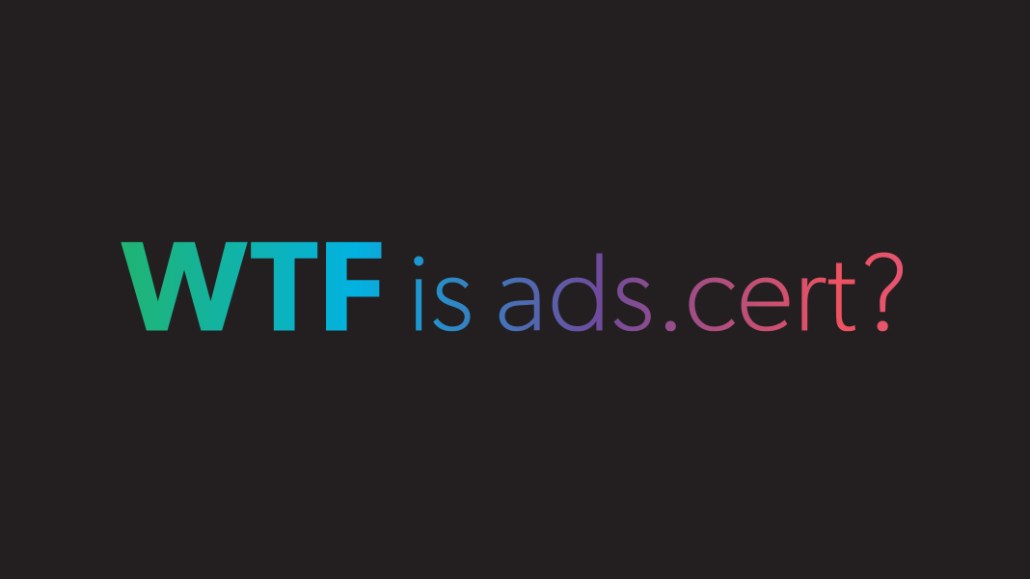Secure your place at the Digiday Media Buying Summit in Nashville, March 2-4

This article is a WTF explainer, in which we break down media and marketing’s most confusing terms. More from the series →
Cleaning up the digital ad supply chain is now the rallying cry for most of the digital media industry, with publishers, brands, agencies and ad tech vendors all piling in.
That drive toward transparency has made the somewhat dryly named ads.txt a hot topic in media. Momentum behind ads.txt adoption is increasing, with 44 percent of publishers that run digital advertising implementing it by the end of October.
But ads.txt is not bulletproof against ad fraud. Human errors like misspelling supply-side platform names in ads.txt files have wrongly penalized exchanges from having their inventory being picked up. Plus, most ads.txt files don’t specify the type of inventory — display, video or native — a vendor is allowed to sell. That means display inventory can still be repackaged as video, for example, to boost CPMs.
These issues have given rise to a new awkwardly named upgrade: ads.cert. Here’s an explainer.
WTF is ads.cert, and how is it different from ads.txt?
Ads.cert is the Interactive Advertising Bureau’s upgrade to ads.txt and uses cryptographically signed bid requests to show the path of inventory and authenticate that inventory.
In English, please.
Ads.txt verifies that a business is authorized to sell a publisher’s inventory, giving the publisher more control and assuring buyers they’re only buying from authorized sellers. Ads.cert goes a step further and validates the information that passes between buyer and seller at each stage of the digital ad supply chain, ensuring it’s not vulnerable to being modified or gamed. It’s like a digital signature that lets buyers verify a specific site’s inventory, and it stops fraudsters from tampering with the inventory.
What kind of information is validated?
In the open exchange, buyers use data like domain, location, IP address, device, position on page, impression type and other variables to inform the value of the impression. These variables can be manipulated to look like more valuable impressions. Ads.cert is intended to block that. “If someone adds information to the request, like viewability, they can add their signature to provide transparency and trust in the new variable,” said Chris Crawfurd, vp of sales and product strategy at ad tech vendor Sovrn. “Since it allows every person in the supply chain to provide a signature, it encourages good behavior and a process to track bad behavior.”
Why is that a big deal?
It’s one more step toward full transparency in digital ad transactions, which is what everyone in the supply chain (aside from fraudsters and shady vendors) is gunning for. It also means that a buyer can know for sure they’re not buying display inventory that’s been repackaged as video, for example. “[Ads.cert] provides an audit path to expose anyone trying to sell display as video for monetary gain,” Crawfurd said.
So, everyone will jump on this, right?
Not so fast. Ads.cert can only be implemented if a company has upgraded its tech infrastructure from OpenRTB 2.5 to version 3.0, which was released by the IAB and designed to handle new kinds of programmatic buying and selling such as header bidding, content sales, product recommendations and connected TVs.
What will it take to upgrade?
OpenRTB 3.0 is not backward compatible, meaning that you can’t use it with existing legacy technology systems. Demand-side platforms, SSPs and exchanges will have to pay hefty engineering costs in order to become compatible.
Sounds like a pretty big barrier.
For now, maybe. But stay tuned for developments, as it will likely be a big 2018 talking point.
More in Media

From feeds to streets: How mega influencer Haley Baylee is diversifying beyond platform algorithms
Kalil is partnering with LinkNYC to take her social media content into the real world and the streets of NYC.

‘A brand trip’: How the creator economy showed up at this year’s Super Bowl
Super Bowl 2026 had more on-the-ground brand activations and creator participation than ever, showcasing how it’s become a massive IRL moment for the creator economy.

Media Briefing: Turning scraped content into paid assets — Amazon and Microsoft build AI marketplaces
Amazon plans an AI content marketplace to join Microsoft’s efforts and pay publishers — but it relies on AI com stop scraping for free.








